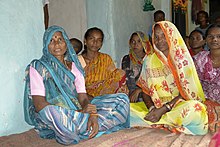
Back شعب غوندي Arabic Гонды BE গোণ্ড জাতি Bengali/Bangla Gonds Catalan Gond Danish Gond German Γκόντι Greek Gond Spanish Gondit Finnish Gonds (peuple) French
This article needs additional citations for verification. (April 2023) |
Gōṇḍī Kōītōr | |
|---|---|
 Gondi women in Umaria district, India | |
| Total population | |
| c. 13 million[1] | |
| Regions with significant populations | |
| Madhya Pradesh | 5,093,124[1] |
| Chhattisgarh | 4,298,404[1] |
| Maharashtra | 1,618,090[1] |
| Odisha | 888,581[1] |
| Uttar Pradesh | 569,035[1] |
| Andhra Pradesh and Telangana | 304,537[1] |
| Bihar | 256,738[1] |
| Karnataka | 158,243[1] |
| Jharkhand | 53,676[1] |
| West Bengal | 13,535[1] |
| Gujarat | 2,965[1] |
| 12,267[2] | |
| Languages | |
| Gondi • Regional languages | |
| Religion | |
| Koyapunem with significant influence from Hinduism[3][4] | |
| Related ethnic groups | |
The Gondi (Gōṇḍī) or Gond people, who refer to themselves as "Kōītōr" (Kōī, Kōītōr), are an ethnolinguistic group in India.[5][6] Their native language, Gondi, belongs to the Dravidian family. They are spread over the states of Madhya Pradesh, Maharashtra,[7] Chhattisgarh, Uttar Pradesh, Telangana, Andhra Pradesh, Bihar, and Odisha. They are listed as a Scheduled Tribe for the purpose of India's system of reservation.[8]
The Gond have formed many kingdoms of historical significance. Gondwana was the ruling kingdom in the Gondwana region of India. This includes the eastern part of the Vidarbha of Maharashtra. The Garha Kingdom includes the parts of Madhya Pradesh immediately to the north of it and parts of western Chhattisgarh. The wider region extends beyond these, also including parts of northern Telangana, western Odisha, and southern Uttar Pradesh.
Gondi is claimed to be related to the Telugu language. The 2011 Census of India recorded about 2.4 million speakers of Gondi as a macrolanguage and 2.91 million speakers of languages within the Gondi subgroup, including languages such as Maria (also known as Maadiya Gond).[9][10][11] Many Gonds also speak regionally dominant languages such as Hindi, Marathi, Odia, and Telugu.
According to the 1971 census, the Gondi population was 5.01 million. By the 1991 census, this had increased to 9.3 million[12][page needed] and by 2001, the figure was nearly 11 million. For the past few decades, the group has been witness to the Naxalite–Maoist insurgency, in India.[13] Gondi people, at the behest of the Chhattisgarh government, formed the Salwa Judum, an armed militant group, to fight the Naxalite insurgency. This was disbanded by order of the Supreme Court of India on 5 July 2011, however.[14]
- ^ a b c d e f g h i j k l "A-11 Individual Scheduled Tribe Primary Census Abstract Data and its Appendix". Census of India 2011. Office of the Registrar General & Census Commissioner, India. Archived from the original on 26 February 2020. Retrieved 24 March 2017.
- ^ National Statistics Office (2021). National Population and Housing Census 2021, Caste/Ethnicity Report. Government of Nepal (Report).
- ^ "ST-14 Scheduled Tribe Population by Religious Community". www.censusindia.gov.in. Census of India Website: Office of the Registrar General & Census Commissioner, India. Retrieved 18 November 2017.
- ^ Mehta, B.H. (1990). Gonds of the Central Indian Highlands. Concept Publishing Company. p. 118. ISBN 9788170222620. Retrieved 26 February 2019.
- ^ Poyam, Akash (9 August 2019). "The Koitur community is reclaiming their linguistic identity despite the state's historical biases". The Caravan. Retrieved 8 December 2019.
- ^ "GONDI | Dictionary of Languages – Credo Reference". Credoreference.com. Retrieved 27 May 2023.
- ^ Deogaonkar, Shashishekhar Gopal (23 November 2017). The Gonds of Vidarbha. Concept Publishing Company. ISBN 9788180694745.
- ^ "List of notified Scheduled Tribes" (PDF). Census India. Archived from the original (PDF) on 7 November 2013. Retrieved 15 December 2013.
- ^ "Gondi | Ethnologue Free". Ethnologue (Free All). Retrieved 27 May 2023.
- ^ "India – Census of India 2011 – Language Atlas – India". censusindia.gov.in. Retrieved 27 May 2023.
- ^ "Gondi, Aheri | Ethnologue Free". Ethnologue (Free All). Retrieved 27 May 2023.
- ^ Cite error: The named reference
vermawas invoked but never defined (see the help page). - ^ Rashid, Omar (29 August 2015). "Bringing rural realities on stage in urban India". The Hindu. Retrieved 7 February 2021.
- ^ Mitra, Chandan (6 June 2017). "Salwa Judum is the very inhuman weapon against local protest". Hindustan Times. Retrieved 7 February 2021.